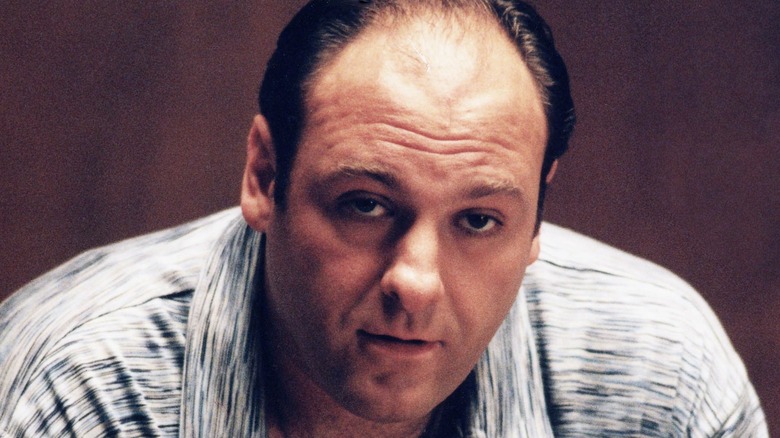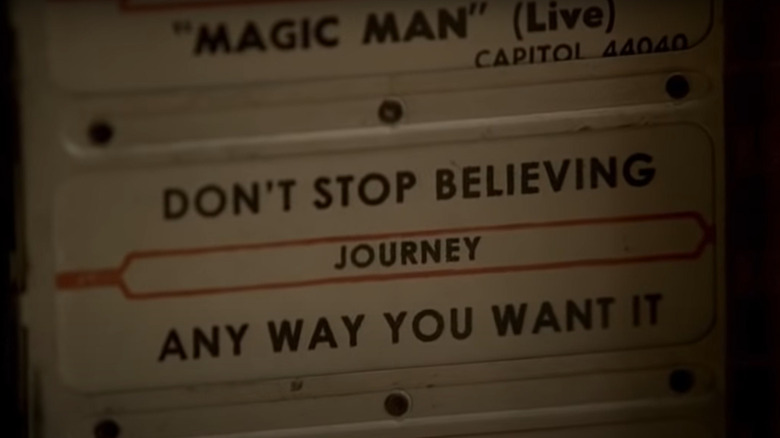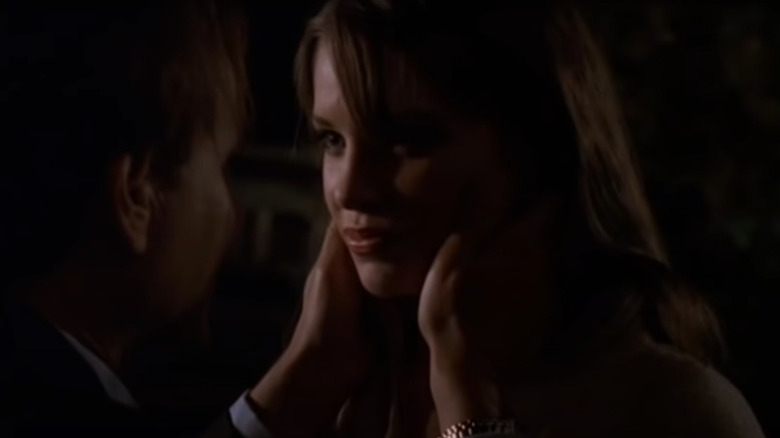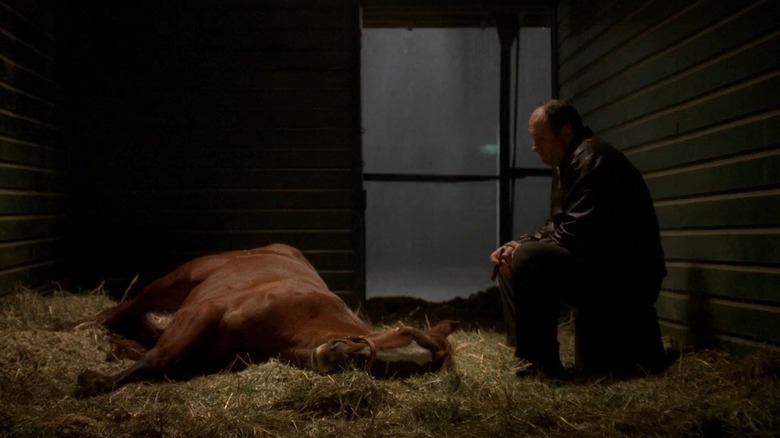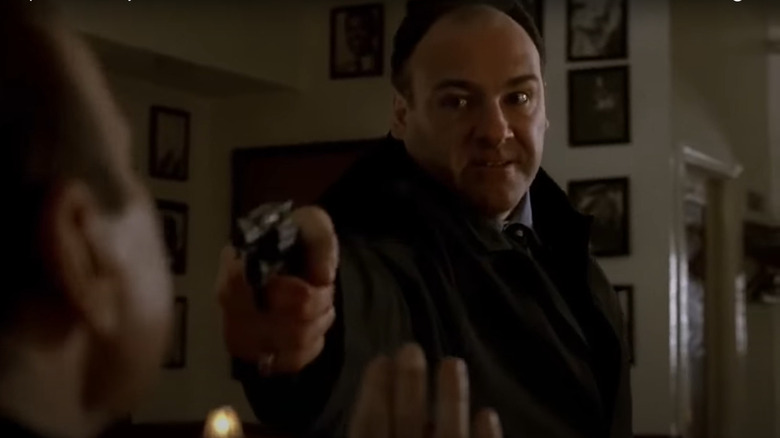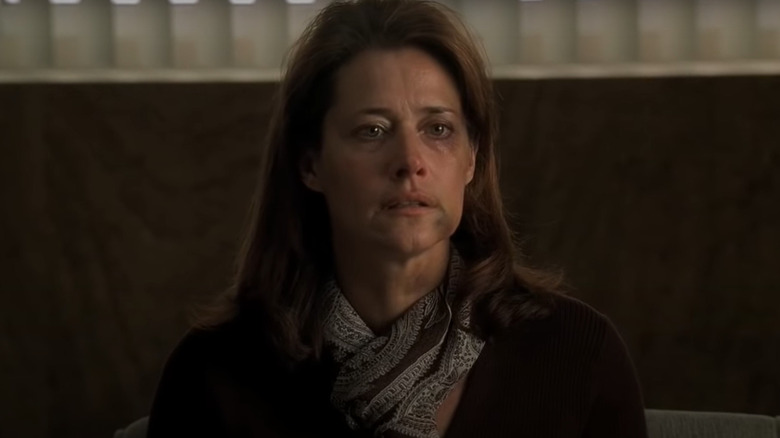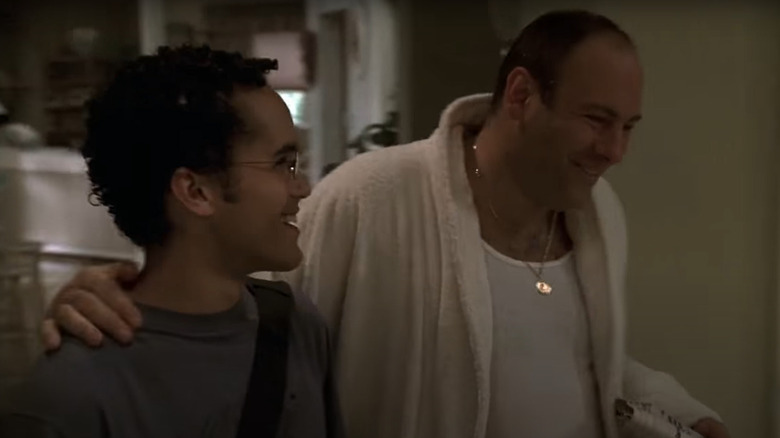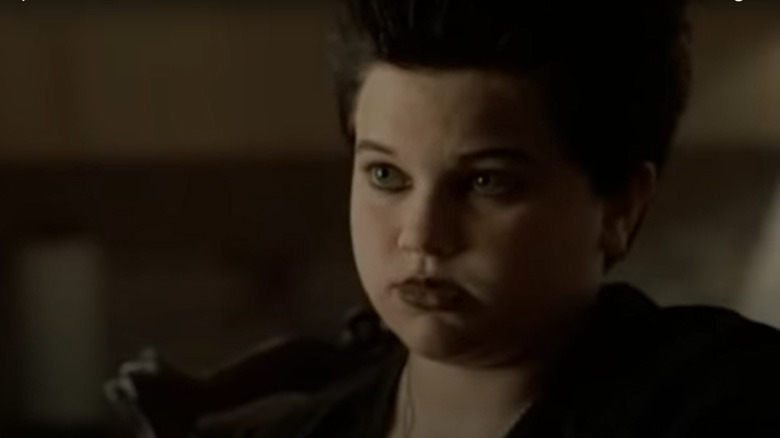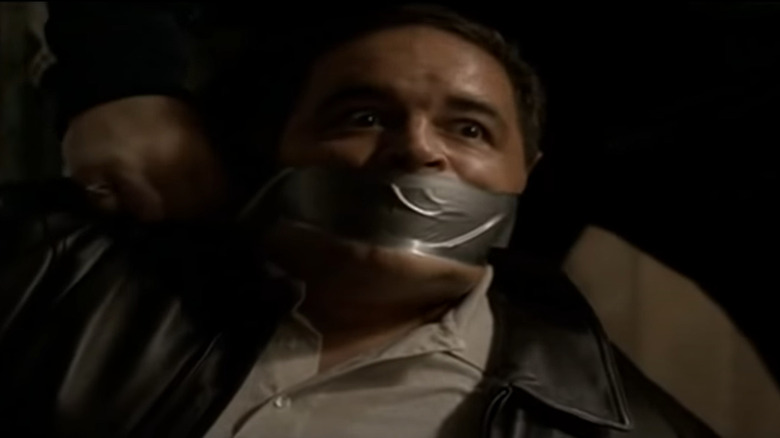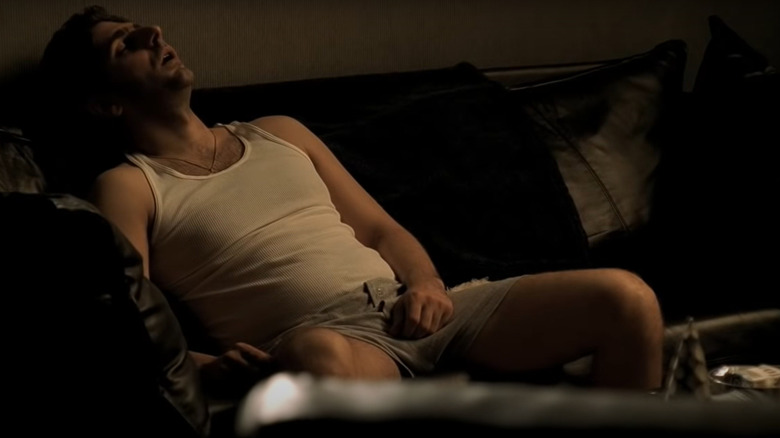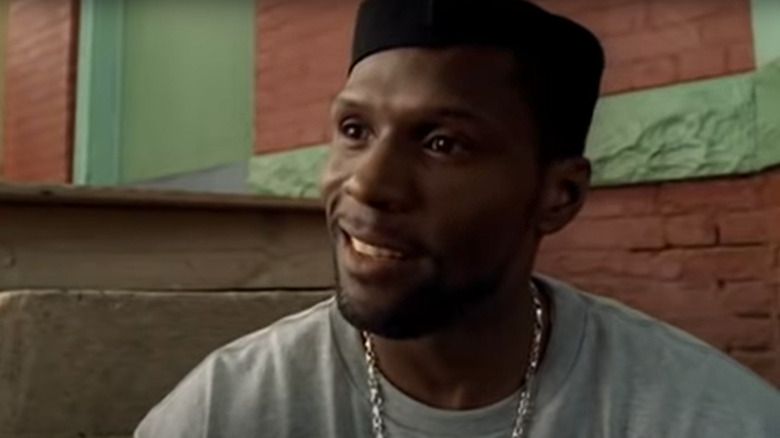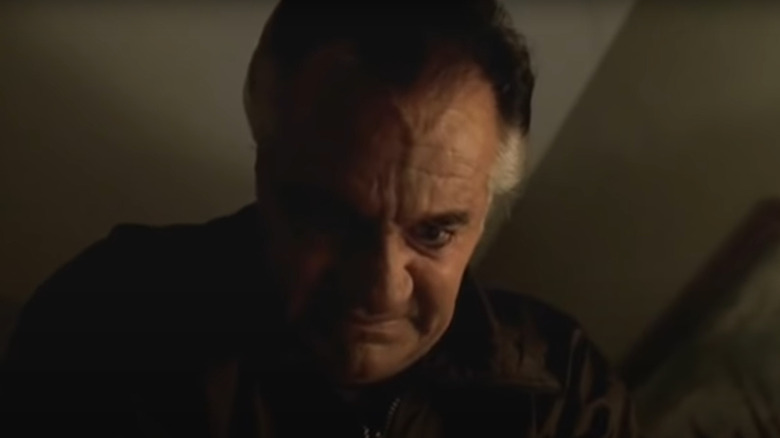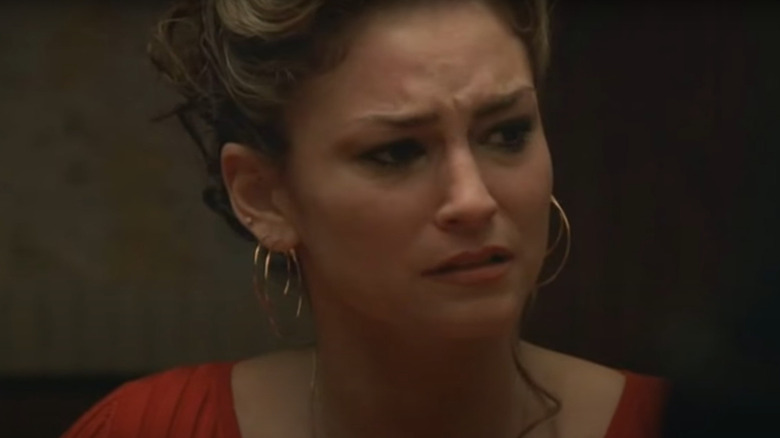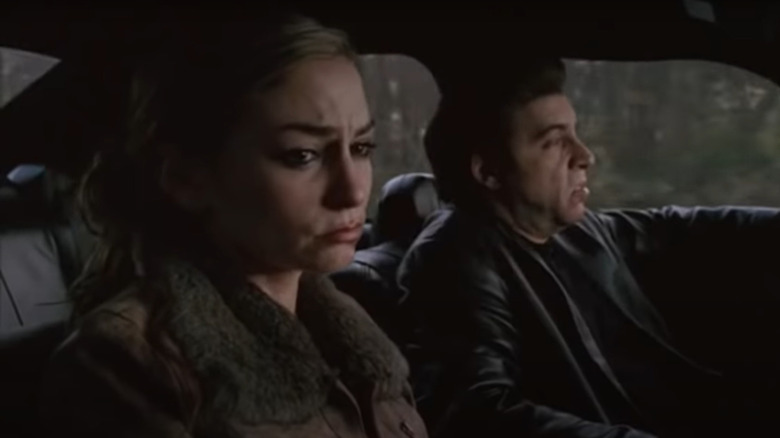All The Times The Sopranos Went Too Far
Nowadays, every article you see about "The Sopranos" talks about how it carried cable TV drama into the new and prestigious millennium. We've forgotten that the saga of New Jersey mob boss Tony Soprano (James Gandolfini) made a lot of folks profoundly uncomfortable during its original HBO run from 1999 to 2007.
The violence of "The Sopranos" – and there's quite a bit — is typically blunt, unstylish, and graphic. Tony and his criminal associates hang out at a "gentlemen's club" known as the Bada Bing! and are not known for treating women as their social equals, to put it mildly. Indeed, "The Sopranos" is loaded with sex and violence; it is not wholesome or family-friendly.
Many of the primary characters are mass-murdering sociopaths. Meanwhile, performatively oblivious bystanders like Tony's wife Carmela Soprano (Edie Falco) are severely morally compromised. Even the FBI agents assigned to stop the mayhem turn out to be bad actors. The show lacks "good guys" to root for and instead humanizes very terrible people while commenting on the contradictions at the center of upper-middle-class American life at the turn of the millennium.
"The Sopranos" entertains you, and it makes you think, but it's not reassuring or uplifting. In other words, somewhat ironically, it's nothing like "The Office," which Gandolfini almost joined. But does "The Sopranos" ever go too far? What even is "too far" for this show?
Ending with a blackout
Let's get the ending of "The Sopranos" out of the way first, since it's already the most scrutinized handful of minutes in the history of television.
With the war between the DiMeo and Lupertazzi crime families seemingly simmering down and A.J. (Robert Iler) turning the corner on a mental health scare, Tony takes his family out for a casual dinner. While Tony, Carmela, and A.J. snack on an appetizer of onion rings and soak in Journey's "Don't Stop Believin'" on the jukebox, the camera lingers on previously unseen characters who happen to also be occupying the traditional American eating establishment. Running late, eldest Soprano offspring Meadow (Jamie-Lynn Sigler) finishes parking and hurriedly crosses the street. Tony looks up, and the screen cuts to black. That's the end.
Creator David Chase made a bold, ultimately correct decision to end "The Sopranos" on an ambiguous note. However, certain members of the audience who'd been obsessively following the show for eight years were somewhat understandably not happy. Did Chase take his artistic inclinations "too far" and cheat his fans out of a more traditional, unambiguous ending? Is the cut to black ambiguous at all? If it's meant to be symbolic of Tony's unexpected death, then it's pretty straightforward as literary allusions go. Wouldn't ending the show with Carmela, Meadow, and A.J. reacting to Tony being mowed down by a hail of bullets be going completely beyond the pale?
Ralph kills Tracee
Some "Sopranos" fans make the case that the show never goes "too far" — it only displays precisely the amount of depravity and brutality necessary for the story. But even if we agree with that opinion, if anything in "The Sopranos" comes close to crossing the line, it's definitely Ralph Cifaretto (Joe Pantoliano) mercilessly beating his pregnant 20-year-old mistress Tracee (Ariel Kiley) to death in the Season 3 episode "University." Don't just take our word for it — The New York Post covered the controversy when "University" first aired in 2001.
A top-tier "Sopranos" episode, "University" has inspired insightful discussions on the show's writing and depiction of women. According to the "Talking Sopranos" podcast, David Chase had started to worry his series was depicting mobsters as funny, cool, admirable guys and felt a sense of responsibility to remind the audience that some members of Tony's crew are capable of unthinkable, utterly inhuman acts.
What starts as a banal disagreement between Ralph and Tracee instantly escalates into Kiley's character — who comes across as a well-meaning, gentle soul in her handful of scenes — lifeless in a pool of her own blood on the concrete. It's the most violent, upsetting moment in "The Sopranos" (meaning it leaps over a very high bar) and establishes Ralph as an irredeemable psycho amongst psychos.
But if it goes too far ... isn't that sort of the point?
Ralph burns Pie-O-My
During the first half of Season 4's "Whoever Did This," a bow and arrow accident inflicts permanent brain damage on Ralph Cifaretto's young son. The tragedy appears to have a humbling effect on Ralph — a serious contender for the award for the most despicable character of "The Sopranos." He contemplates reconnecting with religion and attempts to reconcile with his generally sympathetic ex-girlfriend Rosalie Aprile (Sharon Angela). In a private conversation with Tony, Ralph confesses to a deep sense of remorse for his history of neglectful parenting. It's enough to make you wonder if Ralph is about to get his act together.
Then stables containing multiple racehorses — including Tony's beloved Pie-O-My, who he and Ralph co-own — mysteriously burn down in an electrical fire, or so it seems. In actuality, Ralph torched Pie-O-My for the insurance money, as David Chase confirmed. The fire itself takes place off-camera, but as far as in-story savagery goes, murdering an innocent horse surely stomps across all kinds of lines. It seems that even if Ralph can express feelings of guilt, he operates solely in terms of self-interest.
If you'd like to read about the scene where Tony exacts his revenge for Pie-O-My, you'll have to wait for our "All the Times 'The Sopranos' Didn't Go Far Enough" list, because Ralph deserves a hundred times worse than what he gets.
Tony curb stomps Coco
Hyper-violent TV and movie characters — like Tony Soprano — allow viewers to vicariously indulge in revenge fantasies. That's why some of us cheer Tony on while he takes action we'd never condone in real life. His confrontation with Sal "Coco" Cogliano (Armen Garo) in Season 6's "The Second Coming" starts out as just such an occasion, but it doesn't end that way.
While on a date in New York City, Meadow is minding her own business when a heavily intoxicated Coco stumbles over and subjects her to some thoughts regarding her physical desirability he very much should have kept to himself. Not appreciating the verbal assault on his daughter, Tony tracks down Coco and pounds him into a bloody mess. The mobster concludes the distribution of consequences by forcing Coco to bite down on the lower edge of a counter — a curb of sorts. Tony then drives his foot into the back of Coco's head, we hear a "crack," and we see some bloody teeth hit the floor.
The show stops short of depicting a curb stomp in its full breathtaking horror, which is fine; the mere implication is sadistic enough to nullify our admiration for Tony's righteous fury. At first, we're excited to see Tony beat up somebody who's got it coming. By the end of the scene, we would rather see Coco humbly apologize to Meadow and Tony, the Sopranos graciously accept, and everyone goes home in one piece.
Dr. Melfi's sexual assault
Throughout "The Sopranos," Dr. Jennifer Melfi (Lorraine Bracco) also functions as an audience surrogate, allowing us to hear what Tony's thinking without literally hearing his thoughts. Despite her oft-referenced fascination with the mobster lifestyle and the voyeuristic slant to her ongoing treatment of Tony, she never directly involves herself with his life's cycle of violence and misery. But on one occasion, she considers it.
Dr. Melfi is sexually assaulted in her office building's parking lot in Season 3's "Employee of the Month." The scene depicts the entire awful attack with no cutaway. Arguably the only ethically neutral character on "The Sopranos" is subjected to a random, high-level trauma, and the show makes zero effort to soften the blow for the audience. Bracco conducts a masterclass in conveying an existential sense of violation and rage as the police bungle the arrest of her rapist, allowing him to go free on a technicality. In the gripping final scene of the hour, Melfi bursts into tears at the onset of a session with Tony. She knows telling him what happened to her will result in her attacker experiencing an immense amount of agony before dying in the very near future.
Melfi stares into the abyss of Tony's eye-for-eye ideology for a moment and says, "No." Their therapy session carries on as usual.
If you or anyone you know has been a victim of sexual assault, help is available. Visit the Rape, Abuse & Incest National Network website or contact RAINN's National Helpline at 1-800-656-HOPE (4673).
Tony goes insanely racist on Noah
Part of the magic of "The Sopranos" is its ability to charm you into identifying with characters while demonstrating the danger of using a person's charm as a basis for forming an opinion. Tony's very charismatic, which makes us really want to like him. That's why, in Season 3's "Proshai, Livushka," it's disappointing to find out he's a bigot, even though we already know he's a murderer, a liar, and a philanderer.
Meadow's first college boyfriend is Noah Tannenbaum (Patrick Tully), a half-Black, half-Jewish film major. Early in the relationship, Noah visits the Soprano homestead to watch 1931's "The Public Enemy," starring James Cagney. Noah tries to bond with Tony over their mutual appreciation for classic gangster cinema, but Tony's not having it. Luckily, there are plenty of derogatory Italian slang words for a Black person, so we don't have to deal with Tony using the "n-word," although he definitely thinks it. While the moment doesn't go "too far" on a physical level, Tony's treatment of Noah adds a new kind of terrible to his previously established collection of terrible qualities.
Vito Jr. poops in the boys' locker room shower
Vito Jr. (Brandon Hannan, in the episode we're discussing), the young son of Vito Spatafore (Joseph R. Gannascoli), has a rough go of it. His father disappears, briefly reemerges and explains his absence with a ludicrous story about working undercover for the CIA, dies horribly, then gets outed as a mobster and likely homosexual in the newspaper. This is a lot to process for a child with no real context for understanding any of it, and Vito Jr.'s developing pre-adolescent mind goes totally sideways.
To his credit, Vito Jr. develops an evolved but unappreciated fashion sense in the process of going psycho. Sadly, we learn in Season 6's "Chasing It" that Vito Jr. has been hurting animals, defacing graves, and apparently abusing disabled students at school. The last straw comes when, after a fateful gym class, other boys bully Vito Jr. with homophobic slurs in the locker room shower. In retaliation, Vito Jr. poops in the shower. As "The Sopranos" rarely pulls its punches, we see the poop, and it's exceptionally gross.
Some might argue that showing the poop land on the tile floor is totally unnecessary, merely adding a gross-out component to the scene. Others might say that if the show deployed a whoopie cushion sound effect over shots of the other kids screaming "Ew! Gross! You pooped!", that would've been chickening out. Does Vito Jr.'s pooping in public go too far? You be the judge.
The mutilation of Vito's corpse was definitely not necessary
Vito Spatafore hardly stands as a positive LGBT character, but he does prove that a gay person can be just as homicidal as any straight person.
Though the audience learns Vito's secret in the Season 5 episode "Unidentified Black Males," his mobster associates don't find out until Season 6's "Mr. and Mrs. John Sacrimoni Request." Due to the "traditional" attitudes prevalent in organized crime throughout the region, Vito goes into hiding in New Hampshire under an alias. While residing in the Live Free or Die state, Vito strikes up a short-lived romance with a volunteer firefighter nicknamed Johnny Cakes (John Costelloe) but finds himself psychologically incapable of leaving the mafia lifestyle in his past.
Upon Vito's return to New Jersey, it isn't long before his infuriated brother-in-law, New York mobster Phil Leotardo (Frank Vincent), corners him and watches while goons club him to death on a motel room floor. According to newspaper accounts, by the time the authorities discovered Vito's body, it had been violated with a pool cue. During his life, Vito is a manipulative, opportunistic bully, but a hate crime is a hate crime.
Christopher accidentally kills Cosette
Animals play an essential symbolic role in "The Sopranos" — a family of ducks in Season 1 and Pie-O-My in Season 4 both provide Tony with rare moments of emotional tranquility. Adriana La Cerva (Drea de Matteo) — a nightclub manager and fiancé of Tony's protege, Christopher Moltisanti (Michael Imperioli) — may not have the same type of complex, metaphorical relationship with her Maltese dog Cosette (Little Nicky), but Cosette's sorry fate has seriously ominous overtones.
In the Season 4 episode "The Strong, Silent Type," Christopher sits on Cosette while he's too messed up on heroin to notice and accidentally breaks her neck. Apparently, de Matteo and Little Nicky did not get along, so perhaps Cosette's departure made shooting Adriana's scenes slightly easier for everyone involved. Nevertheless, there's something particularly discomforting and sad about the death of an animal.
Cosette's pointless demise portends what's on the horizon for Adriana and Christopher, but hopefully, Little Nicky didn't mind leaving the show — it would be a shame to harm a small dog, even just emotionally, just for the sake of foreshadowing.
Curtis and Johnson get clipped
Overall, "The Sopranos" has an odd relationship with race. Tony's racism is ostensibly based on Black people's supposed heightened tendencies toward criminal behavior, which is hilarious for its ham-for-brains hypocrisy — Tony is literally in charge of crime.
Furthermore, the number of Black characters on the show is easily outnumbered by the number of imaginary Black people Tony and his associates invent when they need a scapegoat to blame something on. Out of the entire Soprano crew, Christopher's the only one we ever see with any Black friends. Unfortunately, Christopher arranges for both of their deaths the moment they become inconvenient, which makes us wonder about the sincerity of his allyship.
When Tony and Johnny Sack (Vincent Curatola) decide to clip New York boss Carmine Lupertazzi (Tony Lip), Tony assigns Christopher the task of hiring assassins who can make the old man's demise look like a carjacking instead of a mob killing. Christopher taps his former drug dealers Credenzo Curtis (Curtiss Cook) and Stanley Johnson (Universal), who correctly recognize that, in Credenzo's words, "that's some stereotyping s***."
Tony ends up having second thoughts about the hit, and Carmine's would-be executioners die in a blizzard of lead to ensure their silence.
Paulie smothers Minn, an old lady
Lots of people die on "The Sopranos." It's a show about organized crime, and organized crime typically entails lots of murder. There's no way getting around that. However, bumping off an old lady marks a line that even Tony Sirico didn't even want to pretend to cross on camera. According to Vanity Fair, Sirico worried about what his neighbors would do if they knew they lived next door to a guy who chokes out old ladies on TV.
In the Season 4 episode, "Eloise," Minn Matrone (Fran Anthony) shuns Paulie's (Sirico) mother from social activities at the nursing home in which they both reside. Taking exception to what he perceives as shoddy treatment of his mom, Paulie breaks into Minn's apartment, hoping for a substantial burglary takeaway. When he's caught in the act, Paulie knocks over Minn and smothers her with a pillow.
Paulie's killed plenty of people — even defenseless and innocent people — before this. But it takes an especially sick son of a gun to snuff out an old lady.
Adriana throws up on the FBI
FBI agents start catfishing and harassing Adriana at the end of Season 3 and spring their trap on her at the conclusion of Season 4's "No Show." The agents — including Agent Deborah Ciccerone-Waldrup (Lola Glaudini), who'd previously posed as Adriana's friend "Danielle" — snag Adriana off the street while she's walking Cosette, drag her into an interrogation room, and threaten her and Christopher if she refuses to snitch on virtually everyone she knows.
Faced with the possibility of a long stint in prison or what she knows happens to FBI informants around her fiancé's line of work, Adriana throws up all over the agents. It's completely disgusting, going way too far from a visual standpoint, but for what the feds are doing to a (sort of) innocent woman, they deserve worse than projectile puke on their faces. Ironically, this moment also belongs on the "Moments When 'The Sopranos' Didn't Go Far Enough" list.
The death of Adriana
The only main characters who definitely survive "The Sopranos" are A.J. and Meadow, and we only found that out in 2022 due to their appearance in a Chevrolet Silverado Superbowl commercial directed by David Chase. The way the series wraps up (or doesn't) the fate of the handful of characters we don't see killed onscreen remains up in the air; which is to say, a "Sopranos" character getting clipped isn't a transgression in itself because — except for A.J. and Meadow, and we've explained — maybe they all get clipped in the end.
In Season 5's "Longterm Parking," Silvio "Sil" Dante (Steven Van Zandt), under orders from Tony, guns down Adriana after Christopher outs her as an FBI informant. It's a shocking, heart-squashing scene — but let's remember, Tony, Sil, and Paulie execute Sal "Big P****" Bonpensiero (Vincent Pastore) in Season 2's "Remember When" under basically the same circumstances.
Big P**** is a mass murderer, while Adriana is the closest thing to an innocent civilian in the Soprano social circle. As long as we don't ask any questions about moral relativity or Big P****'s potential for redemption, Adriana's death looks like a bigger tragedy. When you're Tony Soprano, and your existence is predicated on victimizing others, is executing your de facto nephew's fiancé going "too far"... or is it the cost of doing business?
